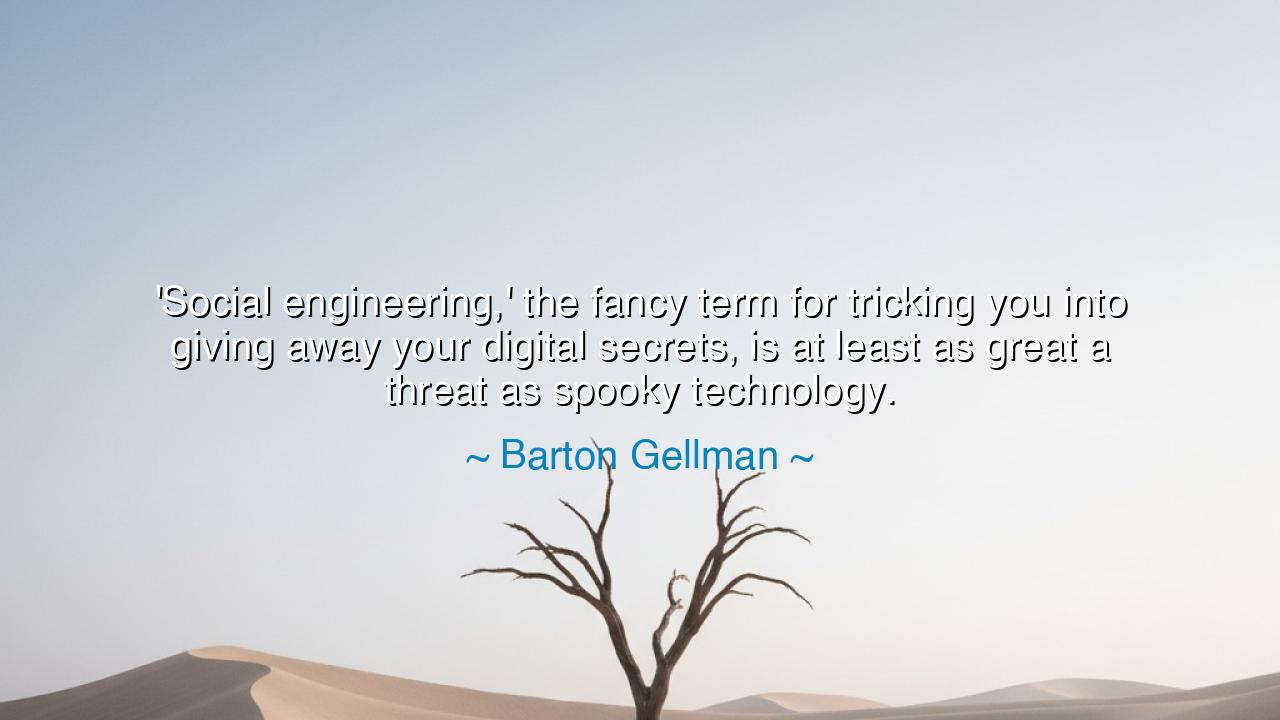
'Social engineering,' the fancy term for tricking you into
'Social engineering,' the fancy term for tricking you into giving away your digital secrets, is at least as great a threat as spooky technology.






The words of Barton Gellman resound like a stern warning to the people of our age: “‘Social engineering,’ the fancy term for tricking you into giving away your digital secrets, is at least as great a threat as spooky technology.” In this declaration, the veil is torn aside, and we are reminded that danger does not always come in the form of gleaming machines or mysterious codes. Often, it comes in the guise of human cunning, clothed in charm, persuasion, or deceit. The sharpest sword may not pierce as deeply as the soft voice that convinces you to surrender your own armor.
The origin of this wisdom lies in the nature of mankind itself. From the days when kings ruled with golden crowns to the era of encrypted passwords and digital firewalls, the greatest vulnerability has always been the human heart and mind. Armies may guard the gates, walls may be fortified with stone or steel, and now with encryption and algorithms, but the clever deceiver whispers past all defenses. What is ‘social engineering’ if not the ancient art of manipulation, reborn in the digital world? Just as spies once disguised themselves to slip into enemy camps, so too do hackers cloak their intent in friendly messages, false authority, or seeming innocence.
Consider the infamous tale of the Trojan Horse. The people of Troy feared the might of Greek warriors and had withstood ten years of siege behind their strong walls. Yet they fell not to the sword, nor to siege engines, but to a trick. The Greeks offered a gift, carved of wood, and by their own decision, the Trojans pulled it within their gates. What no weapon could achieve, deception accomplished. The city was undone from within. So too in our own time: what firewalls cannot be breached, a single unguarded click or unwary word may open.
The modern world has seen countless such examples. The great data breaches of corporations, the theft of identities, the exposure of secrets—these are not always the work of spooky technology humming in hidden rooms. Instead, they are often born from a single phone call, a single email, a single trick that persuaded someone to hand over a password or trust a false request. The clever deceiver needs no supercomputer when the human mind can be persuaded to betray itself. Thus, social engineering is as grave a threat as any machine, for it exploits not circuits, but the weaknesses of trust and haste.
Yet Gellman’s words are not only a warning but a call to vigilance. He reminds us that the true battleground is not merely digital—it is psychological and emotional. To guard against such threats, one must not only strengthen machines but strengthen the self. Patience, skepticism, and awareness are the shields that turn aside deception. Just as the ancients counseled to “know thyself,” so must the modern citizen learn to doubt the too-easy answer, question the too-perfect request, and guard the gates of trust as carefully as the gates of a city.
The lesson is clear: trust must be earned, not assumed. In every age, the enemy knows that human beings are creatures of habit, of kindness, of curiosity. These virtues, when unguarded, become weaknesses. Thus, every man and woman must learn to pause before they answer, to verify before they act, to question before they surrender what is precious. Just as one locks the doors of a house at night, so too must one lock the doors of the mind and heart against the subtle deceiver.
In practice, this means: treat every request for your information with care, even if it comes in the name of authority. Learn the habits of caution—check the sender, confirm the request, doubt the unexpected gift. Speak with your family, your children, your colleagues about these dangers, so that all may be armed with knowledge. For no fortress stands if one gate is left unbarred.
So let Gellman’s words stand as a warning for generations: the threats of machines may be mighty, but the threats of deception are as old as humanity itself. Be wise as serpents, gentle as doves, but never careless with your trust. For in an age where secrets are as precious as gold, and information is the lifeblood of power, the greatest enemy may not be the machine, but the smile that asks you to open the door. Guard well, and be not deceived.






AAdministratorAdministrator
Welcome, honored guests. Please leave a comment, we will respond soon